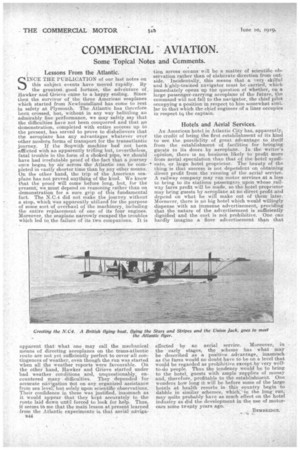COMMERCIAL AVIATION.
Page 18

If you've noticed an error in this article please click here to report it so we can fix it.
Some Topical Notes and Comments.
I Lessons From the Atlantic.
SINCE THE PUBLICATION of our last notes on this subject events have moved rapidly. By the greatest good fortune, the adventure of , Hawker and Grieve came to a happy ending. Since then the. Survivor of the three American seaplanes which started from Newfoundland has come to rest in safety at Plymouth. The Atlantic has therefore been crossed, but, without in any way belittling an admirably fine performance, we may safely say that the difficulties have not been conquered and that no demonstration, completed with entire success up to the present, has served to prove to disbelievers that the aeroplane has any advantages whatever over other modern forms of transport for the transatlantic journey. If the Sopwith machine had not been afflicted with an apparently trilling but, nevertheless, fatal trouble in the form of a choked pipe, we should have had irrefutable proof of the fact that a journey once begun by air across the Atlantic can be completed in vastly shorter time than by any other means. On the other hand, the trip of the American seaplane has not proved anything of the kind. We know that the proof will come before long, but, for the present; we must depend on reasoning rather than on demonstration for a sure grip of this fundamental fact. The.N.C.4 did not make the join ney .without a stop, which was apparently utilized for the purpose of some sort of overhaul of the machinery, including the entire replacement of one of its four engines. Moreover, the seaplane narrowly escaped the troubles which led to the failure of its two companions. It is
apparent that what one may call the mechanical means of directing aeroplanes on the trans-atlantic route are not yet sufficiently perfect to cover all contingences of weather, even though the run was started when all the weather reports were favourable. On the other hand, Hawker and Grieve started under bad weather conditions and, unquestionably, en-. countered many difficulties. They depended for accurate naVigation trot on any organized assistance from sea level, but solely upon scientific observations. Their confidence in these was justified, inasmuch as it would appear that they kept accurately to the route laid down until forced to look for help. Thus, it seems Orme that the main lesson at present learned from the Atlantic experiments is that aerial naviga B44 tion across oceans will be a matter of scientific observation rather than of elaborate direction from out-. side. Incidentally, this means that a "cry skilful and hghly-trained navigator must be carried, which immediately opens up the question of whether, on a large passenger-carrying aeroplane of the future, the command will not fall to the navigator, the chief pilot occupying a position in respect to him somewhat similar to that which the chief engineer of a liner occupies in respect tq the captain.
Hotels and Aerial Services,
An American hotel in Atlantic City has, apparently; the credit of being the first establishment of its kind to see the possibility of great advantage to itself from the establishment of facilities for bringing guests to its doors by aeroplane. In the writer's opinion there is no business likely to profit more from aerial speculation than that of the hotel syndicate, or large hotel proprietor. The beauty of the thing is that success is not dependent on obtaining direct profit from the running of the aerial service. A railway company may run motor services at a loss to bring to its stations passengers _upon whose railway fares profit will be made, so the hotel proprietor may bring guests by aeroplane at no direct profit and depend on what he will make out of them later. Moreover, there is no big hotel which would willingly dispense with an immense advertisement, providing that the nature of the advertisement is sufficiently dignified and the cost is not prohibitive. One can hardly imagine a finer advertisement than that
effected by an aerial service. Moreover, in the early stages, the scheme has what may be described as a positive advantage, inasmuch as the fares would no doubt have to be on a level that would be regarded as prohibitive except by very well to-do people. Thus the tendency would be to bring to the hotel, guests with ample supplies of money and, therefore, profitable to the establishraent. One wonders how long it will be before some of the large hotels at health resorts in this country begin to dabble in similar schemes, which', -in the long run, may quite probably have as much effect on the hotel industry as did the development in the use of motorcars some twenty years ago. •
























